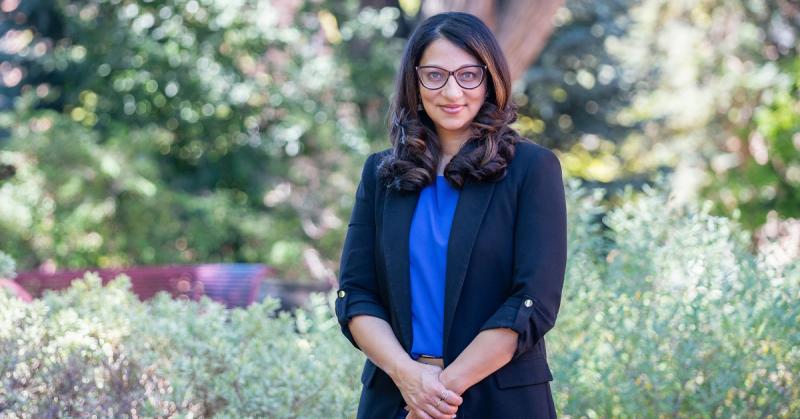Creating Change through Policy
New GSSW Prof. Shetal Vohra-Gupta studies social and cultural determinants of health and health disparities

At a time when mounting political pressure has prompted some universities to limit what faculty can study or teach, the University of Denver Graduate School of Social Work (GSSW) continues to uphold the core social work value of social justice. This fall, Associate Professor Shetal Vohra-Gupta, PhD, joined GSSW’s faculty, bringing with her a research agenda and teaching philosophy deeply grounded in fairness, intentional inclusion and justice.
Vohra-Gupta’s scholarship focuses on the intersections of race, gender and social policy, with a commitment to advancing equity-focused research to inform and shape policy. Her current projects explore the social and cultural determinants of health, health disparities and mental health impacts on young men of color. Previously, she was an assistant professor at the University of Texas at Austin Steve Hicks School of Social Work.
Her passion for policy grew out of her early career as a clinical social worker. As an LCSW, Vohra-Gupta spent several years providing individual, family and group therapy at a residential treatment facility and doing crisis intervention work in a hospital system. She recalls, “In both settings, policy dictated so much about what I could do with patients and clients. I realized that the limitations we faced as social workers were often created by people far removed from the realities of our clients’ lives. I wanted to be part of changing that.” This led Vohra-Gupta to pursue a PhD and dedicate her career to research that connects policy decisions with the lived experiences of communities.
Among her recent projects is the validation of a social determinants of health (SDH) survey developed by People’s Community Clinic, which serves low-income communities of color in Austin, Texas. Because many SDH surveys are too lengthy for clinical use, this five-minute tool allows providers to quickly assess needs such as access to food, housing, or utilities and connect patients to critical resources. Vohra-Gupta explains, “If a doctor sees those responses, it sets the tone for the interaction and signals to the community health worker to step in.”
Vohra-Gupta is also examining the influence of cultural determinants of health on risk for cardiovascular diseases for Asians and Asian Americans. Her other research includes a systematized review published in the Journal of Social Work Education that examines how critical race theory (CRT) is applied in social work curricula. The review identifies CRT’s central roles in helping students understand systemic racism, offering an alternative to traditional cultural competence models and deepening classroom engagement with structural inequities. Another recent article in the Journal of Sex Research explores women’s perspectives on safe sex responsibilities following the U.S. Supreme Court’s Dobbs decision.
In addition to serving on the GSSW faculty, Vohra-Gupta was hired as executive director of GSSW’s Center for Equity Research (C4ER), formally Equity Labs, which offered curricula and training to support equity- and inclusion-oriented organizational change. Although C4ER is evolving to comply with recent mandates by the federal government, Vohra-Gupta says one thing will remain constant: The center’s alignment with social work values and its commitment to transforming systems by connecting community needs with rigorous, evidence-based research.
Over the coming year, much of Vohra-Gupta’s work will involve deepening partnerships with community organizations and incorporating research and policy into the center’s scope. Vohra-Gupta says, “C4ER is grounded in evidence and guided by community,” meaning that the center’s work is driven by data and research but led and informed by the voices and experiences of the people most impacted. She adds, “We don’t just study issues from a distance. We collaborate with communities to understand what equity looks like in practice and use that insight to shape policies and systems that create lasting change.”




